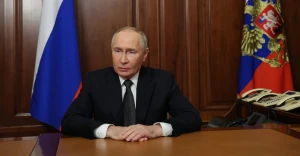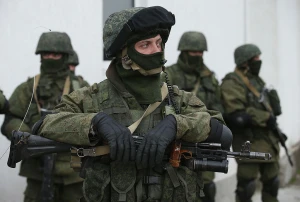
Lithuania to deploy more troops on Belarus border due to Wagner provocations threat
The head of Lithuania's State Border Guard Service (VSAT), Rustamas Liubajevas, said that the situation near Belarus is tense. In response to the threat posed by Wagner mercenaries, there are plans to deploy more officers
This was reported by Delfi.
"The situation on the border with Belarus and Russia is now stable. It remains tense. The likelihood of provocations is high, given that Wagner's mercenaries are now deployed in Belarus. However, so far, we have not seen any special provocations or additional activity near the border with Belarus and Russia," said Liubaievas.
Adequate security measures are reportedly being applied on the border with Belarus, and Lithuania’s State Border Guard Service is ready to deploy additional forces as soon as possible. Liubajevas said the decision was made due to the increase in the number of border guards on the eastern border.
"Together with the Ministry of Internal Affairs, we are now considering the possibility of increasing our capacity on the border with Belarus. The relevant decisions have been made. We plan to increase our contingent in the near future. There are not so many of them near the border. Now, perhaps, there are more of them near Brest, if we are talking about the territory of Belarus. But there is a possibility of provocations near our border," said the head of the Border Guard Service.
He added that border guards are ready for any scenario and undergo special training.
"There are certain algorithms. Our border guards are familiar with them, and we conduct training. If the situation on the border escalates, we can activate the cover plan and, according to this plan, the Lithuanian army, police and other agencies will join us," Liubajevas continued.
How the Wagner soldiers ended up in Belarus
After the mutiny of Wagner PMC leader Yevgeny Prigozhin in late June, the Kremlin announced the relocation of Wagner mercenaries to Belarus.
On June 27, self-proclaimed President of Belarus Alexander Lukashenko confirmed the arrival of Yevgeny Prigozhin in the country. According to him, Wagner mercenaries who arrived with him will not guard the Russian tactical nuclear weapons deployed there. However, Lukashenko emphasized that he expects the mercenaries to help in the defense of Belarus, without specifying the potential source of the country's perceived threat.
On June 29, a satellite recorded the construction of a tent camp near Asipovichy in the Mogilev region of Belarus, and on July 3, Russian media published a photo of an alleged Wagner camp.
On July 11, the Belarusian Ministry of Defense stated that the Wagner mercenaries would train the Belarusian army.
On July 14, media reported that training sessions with units of the territorial troops were taking place near Asipovichy (Belarus), where Wagner PMC fighters were acting as instructors in some military disciplines.
On the morning of July 15, a large convoy of cars and trucks with license plates of the so-called DPR and LPR was spotted in Belarus. Ukraine’s State Border Guard Service confirmed that those were mercenaries of the Wagner PMC.
On Sunday, July 16, the Belarusian Hajun monitoring group reported that two flags - of Russia and the Wagner PMC - had been installed at the checkpoint on the border between Belarus and Russia.
Wagner Group announced that on July 30, their main base in the Russian Federation, located in the village of Molkino in Krasnodar Krai, would be closed.
On July 19, a sixth convoy with Wagner PMC fighters arrived in Belarus.
On July 19, Wagner PMC financier Yevgeny Prigozhin addressed Wagner fighters in Belarus, calling the situation at the front a "disgrace" and urging mercenaries to "wait for the moment to show their full potential."
On July 20, it was reported that another convoy with Wagner fighters arrived in Belarus, which became the ninth since Wagner moved to Belarus, Belarusian Hajun monitoring group writes.
As of the morning of July 20, Wagner mercenaries continue to arrive in Belarus, but do not pose a threat to Ukraine.
Later, on July 23, self-appointed President of Belarus Alexander Lukashenko announced the desire of the mercenaries from the Russian Wagner PMC to "go on an excursion" to Poland. The same day, it was reported that the tenth column of Wagner's mercenaries, which included at least ten pieces of equipment, had arrived in Belarus.
The ISW stated that there is no evidence that Wagner's mercenaries in Belarus have the heavy weapons necessary for a serious offensive against Ukraine or Poland.
On July 25, the 11th column of Wagner's mercenaries arrived in Belarus, this time with armored vehicles. The convoy included at least 29 vehicles. It was also revealed who led them in Belarus.
On July 27, the National Resistance Center reported that Wagner PMC units were looking for people in Belarus who were ready to fight against Lithuania and Poland. Also the same day Belarusian Hajun monitoring group reported that the twelfth column of Wagner's PMC, which included at least 50 pieces of equipment, had arrived in Belarus.
On July 28, 13th convoy of mercenaries with at least 80 vehicles arrived in Belarus.
On July 29, Polish Prime Minister Mateusz Morawiecki announced that more than 100 Wagner fighters had gone to the Suwalki corridor.
On July 31, the Wagner PMC had suspended the work of its regional recruitment centers "indefinitely." And Prigozhin revoked the vacations of employees and ordered them to arrive in Belarus by August 5.
Another location of Wagner PMC was discovered in Belarus near Asipovichy, where mercenaries are using warehouses.
On August 3, Wagner PMC mercenaries settled in Belarus near the border with Lithuania, in the city of Grodno. President Gitanas Nausėda is concerned about the security situation.
On August 4, Lithuania said it plans to close two of the six border crossing points with Belarus to reduce the risk of provocations and threats at the border.
On August 6, on the Latvian-Belarusian state border, border guards from Belarus helped four migrants get through the fence and illegally enter the neighboring country. Lithuania called it a provocation.
On August 7, military exercises started in Belarus. The training grounds are located next to the Suwalki Corridor, a section between Poland and Lithuania, Belarus, and Russia's Kaliningrad region.
On August 8, Polish Defense Minister Mariusz Blaszczak granted the request of the Border Guard Commander and ordered additional soldiers to reinforce the border with Belarus.
- News














































